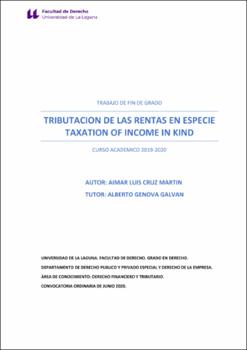Tributación de las rentas en especie.
Author
Cruz Martín, Aimar LuísDate
2020Abstract
En el presente trabajo se aborda la tributación de las rentas en especie en nuestro
ordenamiento jurídico. Se comienza exponiendo sucintamente el concepto tributario de
renta elaborado por la doctrina científica para, a continuación, proceder a analizar qué
manifestaciones de la renta ha decidido someter a gravamen el legislador español y a
través de qué tributos. Tras establecer el tratamiento fiscal que recibe la renta en nuestro
sistema tributario, se analiza cuál es la posición concreta que ocupan las rentas en especie,
aludiéndose a su definición legal y subsumiéndolas en el hecho imponible del Impuesto
sobre la Renta de las Personas Físicas, con especial atención a los supuestos de exención
recogidos en la normativa vigente. Se analizan las reglas de valoración de las rentas en
especie contenidas en las normas tributarias, los problemas a los que la propia valoración
puede dar lugar, así como la técnica tributaria del ingreso a cuenta y las obligaciones
derivadas del mismo para el pagador de la renta en especie. Para concluir, y en aras a
obtener una visión multidimensional, se alude a las limitaciones contenidas en la
legislación laboral para los salarios en especie y a las posibles consecuencias, a efectos
del Impuesto sobre Sociedades, que pueden derivarse para las personas jurídicas que
abonen rentas en especie. This work adresses the taxation of income in kind in the spanish legal system. It begins
by succinctly exposing the concept of taxable income elaborated by the scientific
doctrine, and then proceeds to analyze which manifestations of income the Spanish
legislator has decided to tax and through which taxes. After establishing what is the
treatment taxable income receives in our legal system, an analysis is made of the specific
position income in kind occupies, referring to its legal definition and the way it relates to
the spanish Personal Income Tax, with special attention to the exemptions included in the
current regulations. Then, we proceed to analyze the rules of valuation of income in kind
contained in the tax laws, the problems inherent to the act of valuation itself, as well as
the technique of payments on account and the obligations derived from it for the payer of
income in kind. To conclude, and in order to obtain a multidimensional vision, reference
is made to the limitations contained in labor legislation for wages in kind and the posible
consequences, for the purposes of Corporation Tax, that may be derived for legal persons
who pay income in kind





